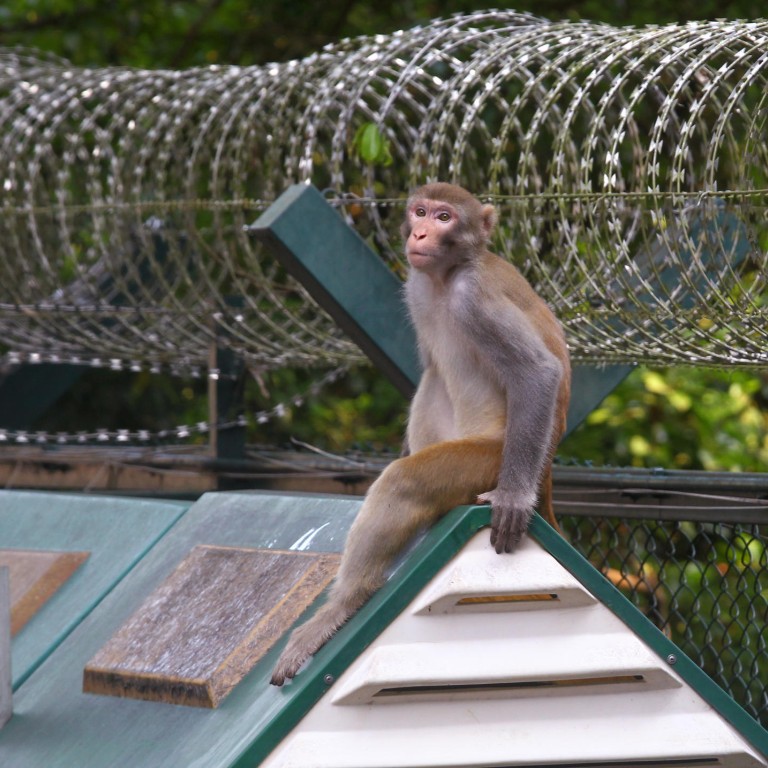
Hong Kong's monkey population increasingly harassing hikers and residents for food
Academic says there are too many macaques and they are overdependent on humans who feed them despite the threat of prosecution
While the Planet of the Apes films may be nothing more than Hollywood fantasy, Hongkongers could be forgiven for feeling like they live in a City of the Monkeys.
And while the city's 2,000 or so feral macaques may lack the super-intelligence that drives their big-screen counterparts - back in cinemas with the new film - they can send hikers and residents nuts.
Despite efforts to control them, the monkeys eagerly chase country park visitors for food and have even strayed into teeming urban areas like Mong Kok and Tsim Sha Tsui.
In the latest incident last week, one was nabbed outside a Lam Tin public library.
"They are taking over," said an elderly hiker who regularly frequents the monkeys' main domain at Kam Shan, popularly known as "Monkey Hill".
"They are annoying … one pushed my bag when they saw bread peeking out," said the hiker
The problem persists despite more than a decade of efforts to keep the population in check.

The problem stemmed from the fact that monkeys had become dependent on humans for food, and there may not be enough food in the environment to sustain them, said Professor David Dudgeon, head of the University of Hong Kong's department of ecology and biodiversity.
"If monkeys grow up knowing that people are their source of food, they won't go back to the way they 'should' behave," Dudgeon said. "You get monkeys that have always been fed by humans ... they won't even know how to go out to hunt for food."
The government banned the feeding of wild monkeys in 1999, setting a maximum fine of HK$10,000. But the ban applies only within Kam Shan and its surrounding country park areas, and those convicted have been fined an average of just HK$500 to HK$1,000.
Dudgeon said the fine needed to be raised and the ban better enforced and extended to areas beyond the parks.
Between 2009 and last year, 547 people were prosecuted for illegal feeding, mostly of monkeys. The ban is enforced by officers who patrol the park roughly once a day.
To reduce their dependence on humans, the government planted 200,000 fruit trees across the park between 2001 and 2008.
Yet the trees only produced fruit from May to October, leaving monkeys reliant on other food sources for much of the year, Dudgeon said. Although plants bore fruit during the rest of the year in shrublands, their fruits were small, and monkeys did not typically occupy those areas, he added.
Hungry and bold, the monkeys typically stray to the edges of residential areas near the parks. However in recent years, monkeys have begun straying further, with some even getting into the bustling heart of the city.
"We don't know the reason, but they suddenly appear in the middle of the city," said Shek Chung-tong, an officer from the Agriculture, Fisheries and Conservation Department.
Monkeys can also act aggressively because they are unafraid of humans. In the past, monkeys have snatched food from people, broken into buildings and even stolen food from convenience stores, according to Shek.
It's been a while, however, since a monkey matched the feat of a macaque who, in 2001, led police on a 10-hour chase through Tsim Sha Tsui.
To stabilise the population, the government sterilised 2,790 monkeys between 2007 and last year, bringing the population down by about 15 per cent to 2,000.
An unintended side effect of sterilisation was that some females now lived longer because they didn't have to breed anymore, Shek said. The average life span of a macaque is about 25 years.
"But the situation is much better than before," Shek said.
According to Dudgeon, the monkeys thrive because of both human feeding and Hong Kong's benign environment, but the population now exceeds what the forests are able to support.
"In the short term, the nuisance won't go away and might get worse," Dudgeon said. "Eventually, if the feeding stops and sterilisation continues, the numbers will decline but that will take time."

